
Cover photo by Mikhail Nilov
In 1950, the average life expectancy worldwide was 46 years. In 2020, this figure rose to 73. The extension of human life also brings with it radical changes in health services.
The challenges facing the healthcare sector can be grouped under several headings:
- Classical health services are limited by physical access and human resources.
- Increasingly expensive treatment options
- The growth of the audience looking for alternatives to traditional health insurance
We now need solutions that align with the financial and physical needs of a larger population.
For these solutions to truly matter, they must be financially within reach and physically accessible—challenges that can only be addressed through technological innovation and business model transformation.
Transformative Technologies in the Healthcare Sector
1. Artificial Intelligence and Big Data Analysis
Artificial intelligence is revolutionizing the healthcare industry, from diagnoses to treatments to surgeries. The healthcare industry generates a huge amount of data, including biometric data.
Analyzing this data with artificial intelligence:
- More accurate diagnoses
- Personalized treatment plans
- Advanced surgical operations
- Detecting epidemics in advance
- Optimizing healthcare
- Provides the opportunity to develop new drugs
Notable Collaborations and Initiatives:
- Apple & Health Gorilla : Collaboration to integrate patient medical records into the Apple Health app. ( Apple is working with this small start-up to change how we track our health )
- Roche & Flatiron Health : $1.9 billion acquisition to accelerate cancer research and drug development. ( Roche continues to acquire healthcare-focused ventures: $1.9 billion for Flatiron Health )
- Medtronic & Nutrino : By acquiring Nutrino, a startup it has been working with since 2016, Medtronic was able to integrate AI-powered nutrition insights with continuous glucose monitoring data. ( Medtronic acquires AI-powered nutrition platform Nutrino )
2. Telemedicine and Virtual Treatment
Remote vital data monitoring solutions offer a diversified service portfolio. Contactless, low-cost and continuous monitoring of basic health parameters responds to the needs of specific segments of the population.
Notable Collaborations and Initiatives:
- CVS Health & Sleepio: Integration of digital therapeutics solution offering cognitive behavioral therapy for insomnia into CVS portfolio. ( Sleep Therapy for the Masses May Be Coming to You Soon )
- Binah.ai & Endava: Signed a new collaboration to support personalized and preventive care models by integrating an AI-powered health data measurement platform into global healthcare systems. ( Endava Partners With Binah.ai on Enhanced Health and Wellness Monitoring Solutions )

- TytoCare & AXA Insurance Koç Healthcare: Tytocare provides an integrated system combining hardware and software that enables remote initial doctor consultations, eliminating trips to medical facilities. AXA Insurance and Koç Healthcare have launched a digital health insurance product in Turkey that offers remote examinations without going to a hospital, in collaboration with each other. ( AXA Insurance and Koç Healthcare are bringing the hospital to your home with a $5 million investment )
3. Wearable Technologies and Digital Therapy
The number of connected wearable devices worldwide is expected to exceed 1.1 billion by 2022. These technologies include:
- Tracking health indicators such as heart rate, sleep patterns, and physical activity
- Patients manage their health more actively
- Provides the opportunity to prevent or manage chronic diseases

Notable Collaborations and Initiatives:
- Silvertree: Develops wearable devices that provide GPS tracking and fall detection for elderly and at-risk individuals. ( Silvertree Martha Stewart collaboration )
- Verizon & Ultrahuman: Ultrahuman develops smart rings that track sleep, exercise activity, and metabolic health in real time. Verizon has entered the smart wearable technology market by partnering with Ultrahuman to offer the advanced Ultrahuman Ring AIR smart ring, which tracks sleep, movement, and recovery, in stores. ( Verizon Announces Partnership With First Smart Ring, Ultrahuman Ring AIR)
4. Blockchain and Data Infrastructure
Blockchain technology in healthcare:
- Improving the security of medical data
- Protecting the confidentiality of biometric information
- Tracking of medicines and medical devices
- Provides value in areas such as facilitating clinical research and patient monitoring
Notable Collaborations and Initiatives:
- The Groves Medical Group & Medicalchain: Helps securely store and access medical records with blockchain technology. Medicalchain has launched a pilot with London-based The Groves Medical Group, enabling the secure and transparent sharing of healthcare data with blockchain, in a partnership that will enable the UK’s first payment for healthcare with cryptocurrency and individual control of patient data. ( Medicalchain Announces Partnership with The Groves Medical Group )
- AmerisourceBergen & Chronicled: Streamlining healthcare transaction processing with automation, trust, and automated accounting. AmerisourceBergen has partnered with Chronicled on the blockchain-based MediLedger network to deliver a new digital solution that will increase the accuracy of pharmaceutical chargeback transactions and reduce rejection rates. ( AmerisourceBergen Partners with Chronicled to Optimize Pharmaceutical Chargeback Accuracy Using Blockchain-Powered Technology )
5. Robotic Solutions
Robotic technologies increase precision and success rates in surgical interventions.
Collaboration Examples:
- Johnson & Johnson & Verb Surgical: Johnson & Johnson has partnered with Verb Surgical, a robotics and medical device startup focused on developing next-generation surgical robots. The collaboration combines J&J’s medical device expertise with Verily’s advanced technology capabilities to create a platform that aims to democratize surgery worldwide through robotics, visualization, advanced instrumentation, and connectivity. ( Johnson & Johnson Announces Agreement to Acquire Remaining Stake in Verb Surgical Inc. )
- Stryker & Mako Surgical: Stryker acquired Mako Surgical, a developer of orthopedic surgical robots, for $1.65 billion in 2013. The collaboration allowed Stryker to offer robotic-assisted surgical systems for knee and hip replacement surgery. Mako’s robotic technology has improved patient outcomes by giving surgeons greater precision and personalized implant placement. ( Stryker updates Mako surgical robot, introduces joint replacement offering )
New Business Models in the Healthcare Sector
-
Value-Based Care : Payment based on health outcomes rather than the number of patients ( What is value-based care, and why is it so important? )
-
Subscription-Based Healthcare: Offer predictable costs with fixed monthly or annual fees ( No insurance? We have you covered with a dental plan that's better than insurance. )
-
Direct to Consumer Healthcare: Reducing costs by eliminating insurance companies and strengthening patient-physician communication ( What are the challenges of a Direct To Consumer Model in healthcare? )
Conclusions and Implications
Main Actors Shaping the Future of the Industry:
- Technology Giants: Companies such as Apple and Google are entering the sector with wearable technology and data platforms.
- Startups: Develop solutions that focus on specific problems with their flexible and agile structures.
- Strategic Partnerships: Collaborations between companies and startups increase the pace of innovation.
Shortly, technology-supported healthcare services are expected to become widespread and play a complementary role to traditional systems. The increasing presence of global technology companies as infrastructure providers and investors in the Turkish healthcare sector stands out as a factor that will accelerate this transformation.
For organizations looking to make strategic investments in the future of the healthcare industry, collaborations and partnerships with technology startups can be considered key strategies that will provide a competitive advantage.
